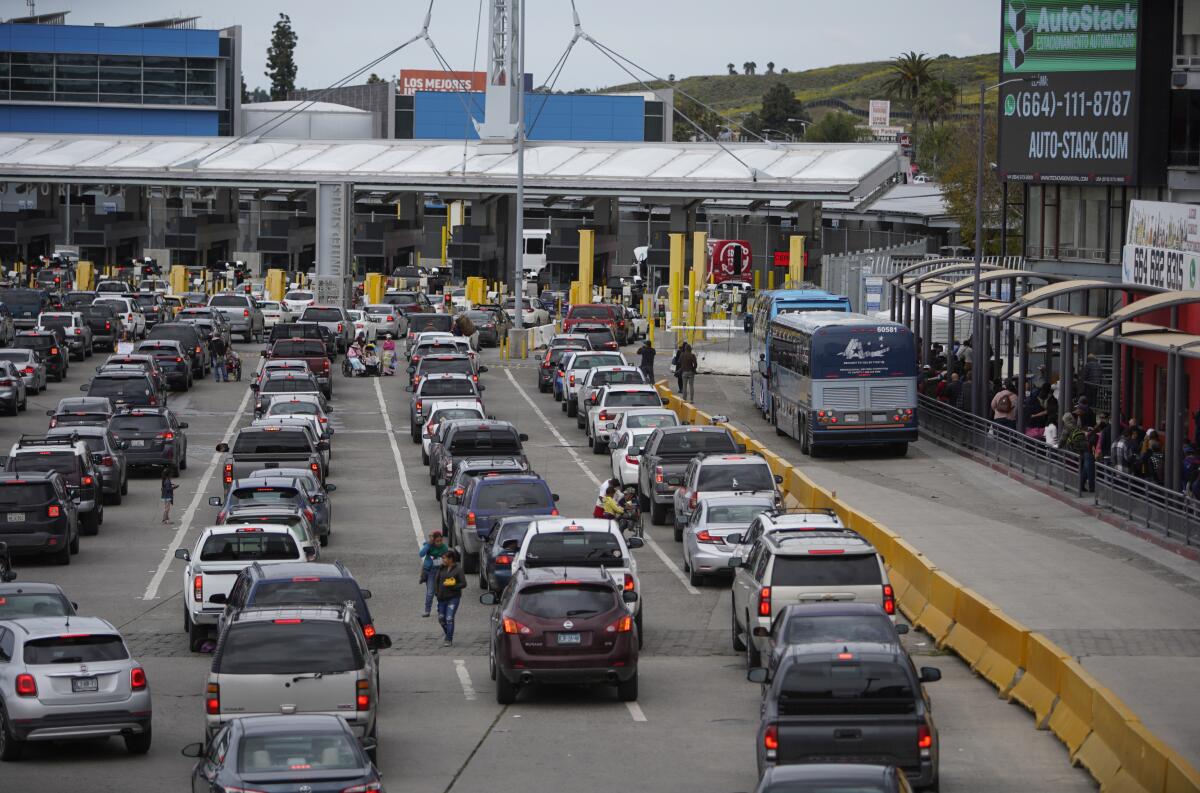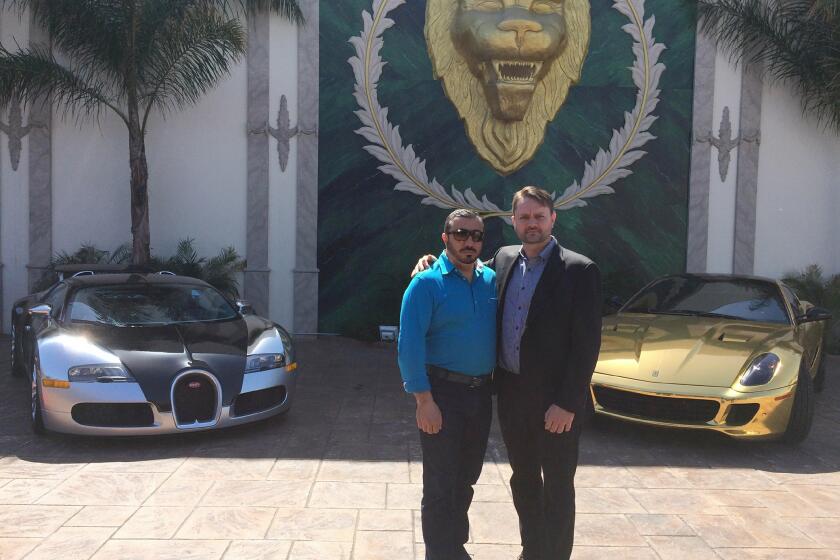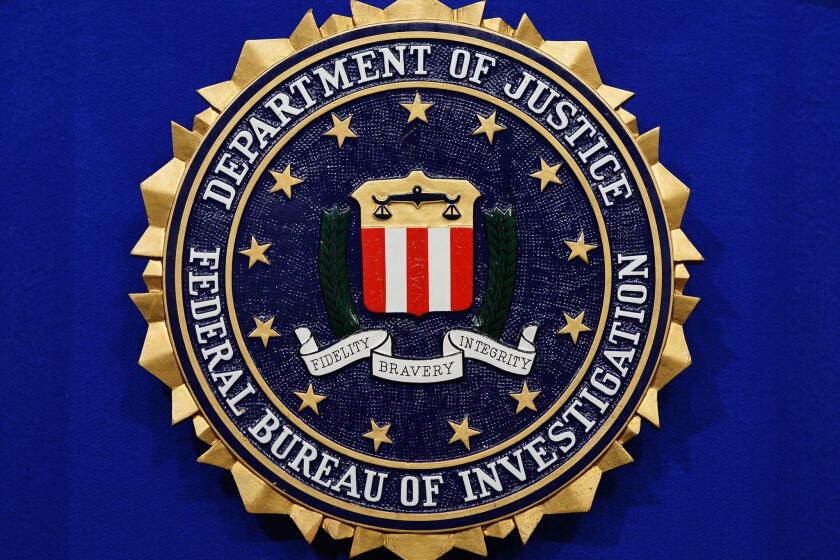‘God is looking over you, and so are the feds.’ Federal agent convicted of taking bribes from organized crime

In 2015, Felix Cisneros Jr. was a decorated federal agent. Within the field office where he worked in San Bernardino, he was known for working big narcotics and money laundering cases, often undercover.
“He had many major drug seizures, money seizures, and he had a very good reputation as a heavy-hitting agent,” a colleague recalled.
He was also deeply in debt.
With his credit cards maxed out and in danger of losing his home, Cisneros agreed to look up a person in a government database in exchange for a $30,000 bribe, according to testimony during his trial this month in federal court.
This, prosecutors said, marked the start of a corrupt relationship between Cisneros and Edgar Sargsyan, an attorney with offices in Beverly Hills who rubbed shoulders with celebrities, politicians, organized crime figures and law enforcement agents.
A jury on Tuesday convicted Cisneros, 48, of 30 counts of bribery, conspiracy to commit bribery, money laundering and tax evasion. He showed no emotion as the verdict was read.
Over the objections of his lawyer, U.S. District Judge R. Gary Klausner ordered Cisneros to be taken into custody immediately, rather than allow him to surrender when he is sentenced Aug. 1. Cisneros took off his tie, belt and jacket, handed them to his attorney and was led away, hands shackled to his waist.
The allegation that a Glendale detective betrayed his associate and arranged a 2016 attack remains unproven.
The agent’s weeklong trial offered a window into a circle of Armenian organized crime figures who showered corrupt lawmen with money and other perks — jaunts to Las Vegas, lavish meals, flights on private jets, liquor and cigars in smoky, members-only lounges — and, in return, received information and protection.
Cisneros grew up in La Puente and served in the Army for four years before joining U.S. Customs and Border Protection in 1996. After working as a Border Patrol agent for a decade, he became a special agent for Homeland Security Investigations, an arm of the Department of Homeland Security.
Around 2008, Cisneros met Levon Termendzhyan, an Armenian immigrant who had amassed a fortune with a collection of gas stations, fuel docks and truck stops.
Cisneros would serve a year in federal prison after being convicted in 2018 of crimes connected to helping Termendzhyan’s business partner reenter the country after traveling to Mexico to negotiate a deal with Pemex, the state oil giant.
Termendzhyan introduced Cisneros to Sargsyan in Las Vegas, where Sargsyan was celebrating his 30th birthday in 2011, he testified at Cisneros’ trial.
“This is our friend,” Sargsyan recalled Termendzhyan saying. “He’s the chief of Homeland Security.”
It was not until five years later, Sargsyan testified, that he asked Cisneros to use his access to tightly controlled government databases in exchange for money.
A Southern California petroleum mogul whose enormous fortune was long suspected of being criminally derived was convicted in Utah federal court of fraud and money laundering.
Sargsyan has pleaded guilty to five felonies — bank fraud, bribing Cisneros and an FBI agent, and lying twice to federal agents — and testified against Cisneros in hopes of earning a reduced sentence.
Sargsyan told jurors how he used John Saro Balian, a narcotics detective from the Glendale Police Department, to relay messages to Cisneros. His first request: Run the name of an associate, a German man, through a federal immigration database to see why he was being turned down for a visa.
Cisneros found the man had been convicted of a drug-related crime years earlier in Germany, and with Balian acting as the go-between, offered to delete any record of the offense for $30,000, Sargsyan testified.
Cisneros later showed Sargsyan two printouts that appeared to be from a government database, a “before and after,” Sargsyan testified. “He said, ‘Look [at] the difference. This isn’t here any more,’” and pointed to some letters or codes that weren’t in the second document, Sargsyan said. “It’s cleared,” he recalled Cisneros saying.
The German man wired $85,000 to Sargsyan’s Beverly Hills law firm, and Sargsyan testified that he withdrew $30,000, gave it to Balian and told him to deliver the money to Cisneros.
Soon after, Sargsyan testified, he learned from Balian that Cisneros was in debt and in danger of losing his home. The Glendale detective, he said, relayed an offer from the agent: If Sargsyan paid down Cisneros’ credit cards, Cisneros would continue to use his access to government databases to help him.
Over the next 11 months, Sargsyan paid off more than $93,000 of Cisneros’ debts, according to evidence presented at trial.
Cisneros’ lawyer, George Mgdesyan, argued the payments were a loan, which Cisneros intended to repay once he restored his credit and refinanced his home. Sargsyan had given the same explanation to FBI agents before changing his story in 2019 to say the payments were bribes.
In exchange for the money, prosecutors argued, Cisneros did whatever was asked of him. “Anytime Edgar Sargsyan said, ‘Jump,’” Assistant U.S. Atty. Michael Morse told the jury, “he said, ‘How high?’”
Morse pointed to a text message that Cisneros sent to Sargsyan in 2016: “God is looking over you,” the agent wrote, “and so are the feds.”
When an FBI agent was charged with taking bribes, a question loomed: Who was the lawyer who told investigators he gave the agent cash for information?
When his brother-in-law was in Tijuana in 2016 trying to get into the United States after being denied a visa, Sargsyan again reached out to Cisneros for help through Balian. Sargsyan told jurors he gave Cisneros $2,000 to $3,000 in cash “just to get him excited, so to speak.”
Cisneros drafted a letter claiming the brother-in-law, Davit Kankanyan, was an informant in a Glendale Police Department narcotics investigation and needed to be admitted to the country. He submitted the request to his supervisor, who signed off on the request. An immigration official at the border ultimately denied it.
That same year, Sargsyan learned agents had searched the home of a man with whom he had been running a massive identity theft scam, in which they took out credit cards and bank loans in the names of foreign students studying in the United States.
Sargsyan worried he too was under investigation. “Immediately, I reached out to my law enforcement people that I had around me,” he testified, describing how he contacted Cisneros and Babak Broumand, then an FBI agent stationed in San Francisco. Broumand has since been charged with taking bribes from Sargsyan; he has pleaded not guilty.
Sargsyan said Cisneros showed him a document that explained why the case had been opened: Someone had leased a car using one of the visa holders’ identities and failed to make the payments. The car had been reported stolen.
For his help, Sargsyan said, he paid Cisneros between $15,000 and $20,000 in cash.
A former FBI agent, Babak Broumand, was charged in a conspiracy to bribe a public official.
In addition to the payments in cash and to his creditors, Sargsyan said he feted Cisneros, Balian and Broumand in Las Vegas. He traveled with the lawmen by private jet to an adult entertainment convention in January 2016, then returned four months later to watch, from ringside seats, Manny Pacquiao fight Timothy Bradley III at the MGM Grand Garden Arena, according to testimony and photographs shown to the jury.
Sargsyan took the men to nightclubs that weekend, running up a $17,000 tab at one and a $19,000 bill at another, prosecutors showed. He paid $6,300 for dinner at Nobu in Caesar’s Palace.
“I was making money,” he said. “I didn’t mind paying.”
Mgdesyan, Cisneros’ attorney, urged jurors to dismiss Sargsyan as a liar and a thief who had changed his story once he realized he was going to prison. He will do and say “anything he can to keep himself out,” including lying under oath and lobbing false accusations against onetime friends, Mgdesyan said.
If Cisneros was guilty of anything, “he’s guilty of picking the wrong person to consider a friend,” Mgdesyan said.
Any names Cisneros ran in a database or other acts he did as a law enforcement agent, Mgdesyan argued, were done at the request of Balian, with whom Cisneros had worked for years on legitimate narcotics investigations.
Balian was charged with crimes unrelated to his relationship with Cisneros or Sargsyan. He pleaded guilty to taking a bribe, lying to federal agents and obstructing justice, agreed to cooperate with the government, and served 21 months in prison.
Mgdesyan questioned why the jury did not hear testimony from Balian, whom prosecutors referred to as an unindicted co-conspirator. Only the ex-detective could describe the true nature of the relationship between himself, Sargsyan and Cisneros, Mgdesyan argued.
More to Read
Sign up for Essential California
The most important California stories and recommendations in your inbox every morning.
You may occasionally receive promotional content from the Los Angeles Times.












